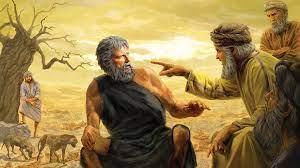Dk – The Priority of God’s Word over Tongues 14: 1-40
The Priority of God’s Word over Tongues
14: 1-40

The stage has been set. Paul has instructed the Corinthians concerning spiritual gifts (to see link click Cf – The Unity and Diversity of Spiritual Gifts). In addition, he has impressed upon them the value of love and its supreme necessity in the exercise of all spiritual gifts (see Ct – The Priority of Love Over Spiritual Gifts). With this clearly before his readers, Paul now takes up the gift of tongues. The Corinthians overestimated this gift and thus became unbalanced. Paul now proceeds to correct that mistake. He does this by showing, at some length, that prophesying, or speaking forth God’s Word, is the most needed, and most fruitful, gift for the Church. He makes an extended comparison between prophesy and tongues, and thus shows the priority of prophesy over tongues.437
One must not confuse prophesy with prophecy. The word prophesy is a verb and the last syllable is pronounced “sigh.” Prophesying is speaking forth God’s Word (Ezeki’el 37:4-5) and declaring His intention to His people as seen here (see Dl – The Word that Builds Up). But, the word prophecy is a noun and the last syllable is pronounced “sea.” Prophecy was a spiritual gift (see Cp – The Gift of Prophecy) during the apostolic era (see the commentary on Acts Ck – Paul Went on to Jerusalem Despite Warnings). The prophet had knowledge of the near historical future or far eschatological future from God. The prophet spoke for Him and was held accountable for his prophecies (see Deuteronomy Dk – A Prophet Like Moses).
Having recognized that there is a role for both speaking in tongues and speaking forth God’s Word in public worship, Paul senses that he must conclude by giving some principles concerning their regulation (see Dp – Order in Public Worship). Unless things are not done in a proper and orderly way, the Corinthian church will have no influence on the society around them. How sad that would be for Paul the missionary!438
But before bringing this chapter to a conclusion, Paul defends his apostolic authority once again. With a series of rhetorical questions, he asks how it is that the Corinthians consider themselves to be the lone authority on God’s Word. If they didn’t write it, then they should obey it just like all the congregations of God’s people are obligated to do. Then Paul concludes with a direct confrontation with them over his status as an apostle.


















 Paired with the more passive side of love (love is patient), is a corresponding active side: love is kind. Paul does not describe love to us in the role of performing great, wonderful, and astounding deeds; he prefers to show us how the inner heart of love looks when it is placed among worldly people and weak believers. He does not picture love in ideal surroundings of friendship and affection where each individual embraces and kisses the other, but in the rough and tuff surroundings of a sinful world and faulty believers, where the stresses of life bring out the positive power and value of love.401
Paired with the more passive side of love (love is patient), is a corresponding active side: love is kind. Paul does not describe love to us in the role of performing great, wonderful, and astounding deeds; he prefers to show us how the inner heart of love looks when it is placed among worldly people and weak believers. He does not picture love in ideal surroundings of friendship and affection where each individual embraces and kisses the other, but in the rough and tuff surroundings of a sinful world and faulty believers, where the stresses of life bring out the positive power and value of love.401



